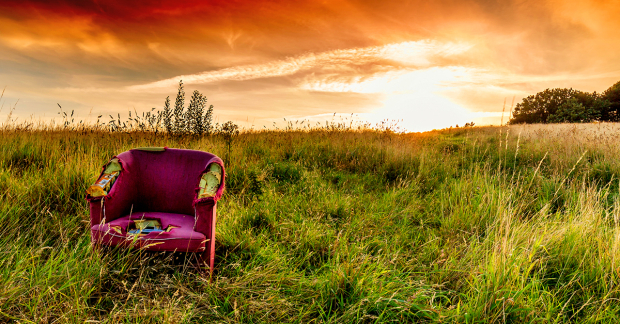NYT's Paul Roseby: 'The pandemic has taught us we crave meaningful connection through storytelling'
The company is staging a new outdoor show

With conventional theatre plans out of the window, organisations and venues are having to concoct vibrant and innovative new solutions. National Youth Theatre is no exception, with the custom-made Sanctuary Theatre welcoming visitors at Soulton Farm in Shropshire. We find out more about the scheme:
Can you explain a bit more about the Sanctuary Theatre?
Paul Roseby, NYT CEO and artistic director: "The Sanctuary is a beautiful brand new earth amphitheatre at Soulton Hall in Shropshire, created to offer support after the Covid-19 related theatre closures. It sits beside open agricultural fields and a burial site ‘Soulton Barrow' both created by farmer Tim Ashton. We've all got a responsibility to try and make theatre happen safely and Tim is leading quite literally from the ground up. He also shares the sustainable ethos of our new show The Last Harvest, which has been created as an urgent response to the climate crisis. As soon as I heard about The Sanctuary it felt right that our first live show since the closure of theatres is to be staged at this unique and inspiring rural setting.
Soulton Hall farmer Tim Ashton: "We were building a monumental landscape at Soulton Hall anyway and then this crisis turned up and it felt important to lean in and give something to support both the creatives who've had their livelihoods threated and audiences who were desperate for some live entertainment. I wanted to make a generous offer from one sector to another and see how farms could help get theatre back on its feet with a creative and imaginative approach."
How do you think audiences will feel hearing stories and watching live performance given the ongoing pandemic?
Ashton: The National Youth Theatre will be the first to perform in our new earth amphitheatre, but at Soulton Hall we've been hosting live theatre in the grounds throughout the summer with over 1000 people coming to enjoy live entertainment. I've witnessed first hand how emotional and significant it's been for audiences and there's been lots of tears – in a good way! People want to get out of their houses and come together to support something that's communal, worthwhile and shared.
Roseby: It might be called The Last Harvest but I think it will feel more like the very first harvest! Here, the fruits of our Zoom-led creatives and cast finally released to perform in the outdoors to a live sold-out audience will feel liberating and emotionally charged in so many new ways but fundamentally to celebrate live young talent in-person for the first time in over six months is a monumental moment. It's been a particular challenge for many young people who've faced uncertainty around exams, university and future career opportunities so it's our combined efforts and collective resistance led by young talent that gives us all hope amongst that continued uncertainty.
'''How has the cast been preparing for what is quite a unique experience for them? ''
Roseby: It's been a strange experience for the cast, who include local performers and young people from all over the country. Due to the current restrictions they have had to devise the show and attend the majority of rehearsals online so the first time they'll be meeting each other in person is just two days before our opening night! I've been hugely impressed with their creativity, a can-do approach, and their abundance of passion for positive change. This may well be art in action, but their action is restricted by the necessary safety measures and that challenge is recognised in the stark narrative they are choosing to tell.
What are your biggest fears for the future of young creatives in the arts, exacerbated by the events this year?
Roseby: We know all too well that it continues to be an incredibly bleak time for freelancers and I worry about the opportunities for the latest generation of graduates. That's why we continue to focus on creating ‘first jobs' at National Youth Theatre and will be doing so more than ever over the next 12 months.
Longer term I fear for the very existence of live traditional theatres, as the culture of supporting and enjoying our local venues becomes more and more detached from what it once was. We are creatures of habit, and if we do not retain the core existence of live entertainment in local venues then the very heart of our cultural identity will be lost for a generation. But I hope the ambition of The Last Harvest will be clear for all to see whether you can attend in person or catch the highlights online.
Do you think the pandemic has created a shift in sentiment around the value of the arts? If so how do you think this could continue?
Roseby: I think if the pandemic has taught us anything it's how we crave meaningful connection with each other through great storytelling. Every time I turn on my TV a recent National Youth Theatre alumni pops up on screen or in the production credits which is a vital reminder that there's no Netflix without our unique talent pipeline. From writers, directors, and designers to performers, producers and technicians we learn our craft in front of a live audience because it's a two way deal that sharpens our skills and hones our instinct for the increasing demands of film and TV.
Most importantly though I think there's nothing like live theatre on a purely emotional level. It's that suspension of disbelief where anything's possible, even for our dedicated young talented story makers in a field in the heart of Shropshire. By continuing to invest in our young, I believe we will reap the rewards once more in a world where to value the arts is to value all of our futures perhaps more equally than before. I live in hope.












